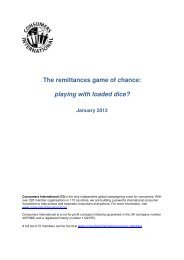Voices for Change: the Consumer Right to Representation
Voices for Change: the Consumer Right to Representation
Voices for Change: the Consumer Right to Representation
Create successful ePaper yourself
Turn your PDF publications into a flip-book with our unique Google optimized e-Paper software.
36<br />
World <strong>Consumer</strong> <strong>Right</strong>s Day 2002: <strong>Voices</strong> <strong>for</strong> <strong>Change</strong><br />
present a completely false stance in a<br />
meeting. It can be very useful <strong>to</strong> criticise <strong>the</strong><br />
government publicly at home <strong>for</strong> <strong>the</strong>ir representations<br />
abroad, or <strong>to</strong> go public with<br />
criticism while <strong>the</strong> meeting is still on.<br />
Immediate feedback mechanisms like <strong>the</strong>se<br />
are a good way <strong>for</strong> those of us involved in<br />
CI campaigns and representations <strong>to</strong> keep on<br />
<strong>to</strong>p of <strong>the</strong> events as <strong>the</strong>y occur and feel that<br />
we’re almost part of <strong>the</strong> deliberations.<br />
Over <strong>the</strong> past five years, CI has deliberately<br />
inserted itself in<strong>to</strong> strategic decision-making<br />
settings. Food and trade are our global<br />
priorities. Food was chosen because of <strong>the</strong><br />
large interest and working base of many of<br />
our members – it’s always good <strong>to</strong> have solid<br />
interest and expertise on <strong>the</strong> ground – and <strong>the</strong><br />
Codex Alimentarius has been <strong>the</strong> focus of this<br />
work. Trade was selected because everybody<br />
believed that <strong>the</strong> WTO and trade decisions<br />
would drive a great deal of <strong>the</strong> world’s power<br />
arrangements over <strong>the</strong> next decades. That<br />
prediction is certainly true.<br />
How are we succeeding as a global movement<br />
in creating <strong>the</strong> powerful global consumer<br />
representative voice? We’ve improved, and<br />
we’re learning fast. But we’ve still got a long<br />
way <strong>to</strong> go. When all <strong>the</strong> major decisionmaking<br />
bodies and our governments know<br />
that <strong>to</strong> exclude <strong>the</strong> consumer movement is<br />
not only not right but will undermine <strong>the</strong>ir<br />
credibility, when <strong>the</strong> right <strong>to</strong> representation<br />
is written in concrete terms in<strong>to</strong> <strong>the</strong>ir<br />
procedures, and when international bodies<br />
and government representatives really believe<br />
that better public policy results from a process<br />
of inclusion of <strong>the</strong> consumer voice ra<strong>the</strong>r than<br />
its exclusion, <strong>the</strong>n we’ll know we’re well on<br />
<strong>the</strong> way <strong>to</strong> serving consumers <strong>the</strong> way that<br />
we should be. – Louise Sylvan<br />
Codex: Long-term strategy<br />
<strong>to</strong> turn input in<strong>to</strong> influence<br />
The Codex Alimentarius Commission is <strong>the</strong><br />
UN body that sets <strong>the</strong> international food<br />
standards used throughout <strong>the</strong> world as a<br />
basis <strong>for</strong> national standards and <strong>to</strong> facilitate<br />
trade in foodstuffs. CI’s three-year Codex<br />
programme seeks <strong>to</strong> enhance consumer<br />
influence at national and regional levels by<br />
working through regional networks,<br />
empowering member organisations (through<br />
training and support) and promoting<br />
international representation.<br />
According <strong>to</strong> its mid-term review, conducted<br />
in 2000, <strong>the</strong> Codex project has been “fairly<br />
successful in implementing activities that have<br />
resulted in greater consumer input in Codex<br />
decisions, especially in <strong>the</strong> areas of food<br />
labelling, food hygiene and risk analysis. But<br />
this has not translated in<strong>to</strong> expected influence<br />
on Codex decisions.”Participation in Codex is<br />
far from satisfac<strong>to</strong>ry, <strong>the</strong> evaluation states.<br />
Few member organisations are consulted by<br />
<strong>the</strong>ir governments, and access <strong>to</strong> Codex<br />
documents remains unsatisfac<strong>to</strong>ry. Although<br />
progress has been slow, some advances gains<br />
have been made and <strong>the</strong> project has helped<br />
increase <strong>the</strong> involvement of members in<br />
policy-making.<br />
In contrast, <strong>the</strong> project has increased <strong>the</strong><br />
capacity of members at <strong>the</strong> national level and<br />
some consumer organisations have made<br />
good progress in influencing <strong>the</strong>ir<br />
governments on Codex issues. Many members<br />
now have a good understanding of <strong>the</strong> Codex<br />
process. A wide range of activities has<br />
promoted <strong>the</strong> importance of Codex at <strong>the</strong><br />
national level. Well-researched and wellproduced<br />
written materials have supported<br />
campaigns. Urgent issues like GM foods have<br />
been tackled in a comprehensive and<br />
sustained manner. A significant number of CI<br />
members have had <strong>the</strong> opportunity <strong>to</strong><br />
participate personally in a Codex meeting at<br />
<strong>the</strong> regional or international level.<br />
The project has carried out many activities <strong>to</strong><br />
increase recognition by national governments<br />
of <strong>the</strong> need <strong>to</strong> get input from consumer<br />
organisations. These activities have increased<br />
<strong>the</strong> skills of member organisations <strong>to</strong> work<br />
with National Codex Committees, which<br />
has elevated <strong>the</strong>ir status in <strong>the</strong> eyes of<br />
government officials involved in food<br />
standard issues.<br />
While <strong>the</strong> obstacles vary from region <strong>to</strong><br />
region, <strong>the</strong> common constraints <strong>to</strong> sustainable<br />
work in Codex include lack of finances and<br />
expertise, apathy of government, opposition


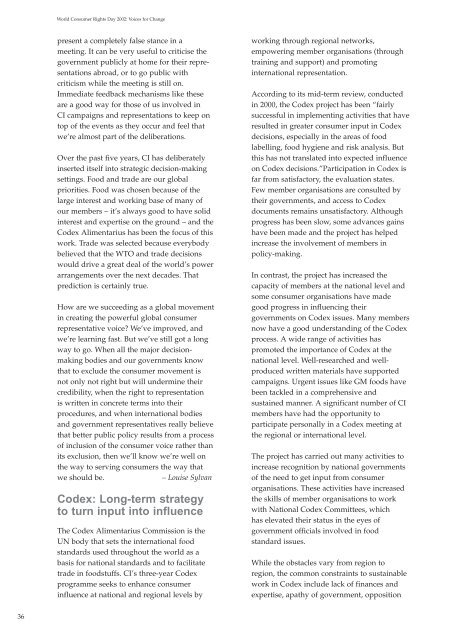
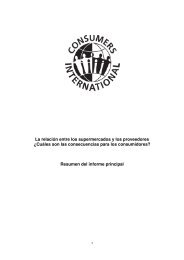
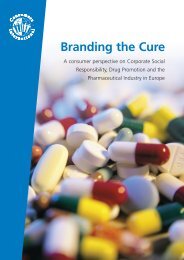
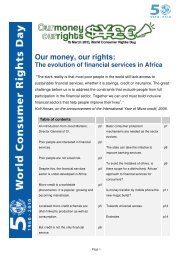
![pkef]Qmf eg]sf] s] xf] < - Consumers International](https://img.yumpu.com/6479658/1/184x260/pkefqmf-egsf-s-xf-consumers-international.jpg?quality=85)
